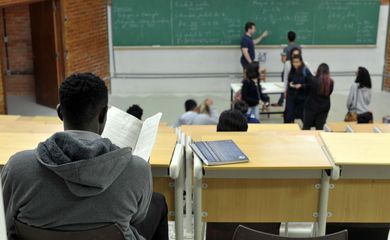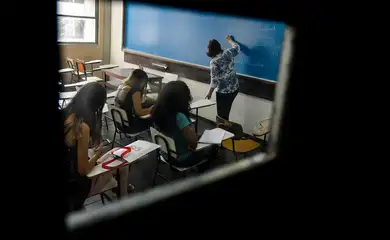PISA: Less than half of Brazilian students know basic math, science

Brazil’s scores in mathematics, reading, and science in the Program for International Student Assessment (PISA) remained stable. However, less than half of the students achieved a minimum level of learning in mathematics and science.

In 2022, the country scored 379 points in mathematics, 410 in reading, and 403 in science, as per results released Tuesday (Dec. 5) by the Organization for Economic Cooperation and Development (OECD). In 2018, the previous year surveyed, the performance was 384 points in mathematics, 413 in reading, and 404 in science.
“The average results in 2022 were practically the same as in 2018 in mathematics, reading, and science. PISA results have remained remarkably stable over a long period: after 2009, only small and mostly non-significant fluctuations were observed in the three subjects,” the report reads, on the performance of Brazilian students.
Applied every three years, PISA assesses the knowledge of 15-year-old students in the three subjects. In all, 690 thousand students from 81 countries took the tests In Brazil, 10,798 students from 599 schools took the assessment. In the 2022 edition, the focus was on mathematics.
After the 2022 results, Brazil remains in the group below the average of the OECD nations in all three subjects: 472 points in mathematics, 476 in reading, and 485 in science.
Twenty points is equivalent to one school year. In science, for example, Brazil is at least four years behind OECD members.
In the ranking, it came 64th in math, 53rd in reading, and 61st in science, behind other Latin American countries such as Chile, Uruguay, Mexico, and Costa Rica.
Global scenario and pandemic
Compared to the 2018 PISA, the average performance in OECD countries fell ten points in reading and almost 15 points in mathematics. In science, the average remained stable.
According to the report, it is estimated that around a quarter of 15-year-olds in OECD member countries—or 16 million—have not reached level 2, i.e. they have difficulty calculating with basic algorithms or interpreting simple texts.
In nations such as Germany, Iceland, the Netherlands, Norway, and Poland, math scores fell by 25 points or more between 2018 and 2022.
“While it is clear that some countries and economies perform quite well in education, the overall picture is more worrying. In more than two decades of global PISA testing, the average score has not changed dramatically between consecutive assessments. But this cycle has seen an unprecedented drop in performance,” the report says.
According to the survey, the COVID-19 pandemic has had an impact on young people's education during this period, with school closures and the adoption of online classes, but it cannot be named as the sole cause of the countries’ lower performance.
The report says it did not identify a “clear difference” in the 2022 scores due to the closure of schools for more or less than three months during the pandemic.
“The COVID-19 pandemic seems an obvious factor that may have impacted results in this period. In reading, for instance, many countries such as Finland, Iceland, the Netherlands, the Slovak Republic, and Sweden recorded lower student scores for some time—in some cases for a decade or more. The educational trajectories were very negative before the pandemic hit. This indicates that long-term issues in education systems are also to blame for the drop in performance. It's not just about COVID.”




